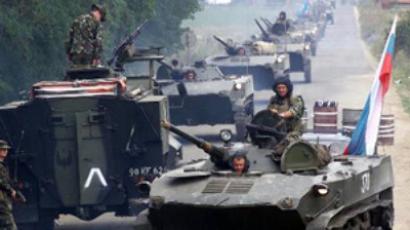Veterans call for Afghanistan “rethink”
For weeks Washington has been debating whether to send more troops to Afghanistan. However, veterans returning from Iraq and Afghanistan are calling on lawmakers to rethink policy and their approach to the wars.
Five veterans met republican congressman Dana Rohrabacher in Washington DC. They look more like young politicians or businessmen than soldiers and marines. They say they want US foreign policy to change completely.
“We’ve got a congress and we’ve got an executive branch that for several decades have thrusted our military into a bunch of operations that haven’t been right, that haven’t been justified,” says former marine corporal Jake Diliberto, founder of “Veterans for Rethinking Afghanistan.”
He was on the ground during the initial invasion in 2001.
“In 2001, we had a really small footprint. We had 3,000 to 4,000 troops on the ground hunting specifically Al-Qaeda. Today, we’re in an enterprise of capacity building and state-building of a failed state with a corrupt government. The longer we stay there, the more it destabilizes the region,” Jake is convinced.
Although he has not served in Iraq he has no illusions about the situation there:
“Our troops are stuck in Iraq. It’s turned from operation ‘Iraqi Freedom’ to operation ‘Enduring Obligation’.”
College sophomore Brock McIntosh, 21, knows all about the strain on the military, having served in Afghanistan from 2008 to 2009.
“We drive around basically for eight hours and we wait to get blown up. And that’s how we discover IEDs or we wait to get shot at, and that’s how we discover where the enemies are,” he recalls.
To them, the enemy seems to be everywhere:
“Just the worst part about that to me is the psychology that you suspect everyone to be a terrorist. There’s no way to build a good and healthy relationship with Afghans. We don’t have really the equipment or the resources or the training to gather good intel, so we don’t really ever know who we are looking for,” Brock believes.
Back in the states, the men are looking for help from lawmakers, calling for funds to support development projects instead of deploying more troops.
Congressman Dana Rohrabacher is not sure they will get what they want any time soon:
“It would probably be easier for a Republican president to suggest a non-military operation or a non-military approach than it would be for Barack Obama,” Rohrabacher says. “Anytime a guy in a uniform comes up and starts asking for troops someplace, some people on my side of the aisle end up saying: Oh yes, whatever the military wants, we’re going to end up giving it to them or we’re not being patriotic.”
The young veterans themselves, though, have seen the war up close and can hardly be accused of being unpatriotic.













